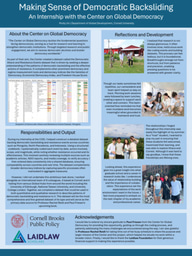My name is Mutty, and I am a senior studying Global Development with a concentration in social and economic development at Cornell University. This summer, I interned as a research assistant at the Center on Global Democracy, where I worked on the Democratic Attack and Resistance Events (DARE) project. This project aims to compile a dataset that provides a more fine-grained, systematic view of democratic backsliding and resistance by capturing details on time, actors, scope, and magnitude across countries. It complements broad democracy indices and detailed case studies by combining their strengths, building on notable existing frameworks, such as the Varieties of Democracy Index (V-Dem), to generate new comparative insights.
During the internship, my team consisted of eight other interns, four from Cornell and four from universities abroad, including the University of Edinburgh, University College London, and National Taiwan University. In my role, I extensively coded instances of democratic attacks and resistance in three countries across various regions worldwide: Indonesia, Mongolia, and North Macedonia. This involved combing through various sources from non-profits, government agencies, and media outlets to record the details of each attack or resistance event as described above. Our work contributed to the comparative outcome of the Center, as the data we collected from 29 countries enables a comprehensive analysis of global trends in democratic backsliding.
Given that the research was based in Ithaca for the duration of the summer, I did not expect to learn many new things. Little did I know that hosting peers from other institutions around the world would enable me to open my eyes and learn so much about the place I’ve called home for the past three years. I tried things in Ithaca that I had never known existed or hadn’t gotten to do, such as roller skating at Cass Park, touring the Lab of Ornithology, and attending a Mongolian festival on a sheep farm 20 minutes north of Ithaca. These adventures we embarked on as a team helped us develop a camaraderie that would later benefit us in keeping each other motivated.
Admittedly, the work we were doing wasn’t particularly exciting. Combing through dozens of sources to identify instances of democratic backsliding in countries we previously had no association with or had given little thought to was not the most enjoyable task. We had to look at such granular details: Who was the instigator? What was the magnitude of the attack according to our given codebook? Who led the resistance, and was it successful? Answering these microscopic questions about events that happened a decade ago required a lot of patience and perseverance.
Moreover, I learned that the work the Center is conducting is very important. The efforts are filling in an important gap in current attempts to understand global trends in democratic backsliding. Moreover, the attention is not only on how democracy can erode, but also on efforts to push back against this erosion, adding a critical nuance to the scholarship.
However, what I learned about myself is that I prefer to work in a more high-pressure and structured environment in the future. Without constant or strict deadlines looming, it was challenging at times to hold myself accountable when clear deadlines were not set. Nevertheless, I thoroughly enjoyed working as a team and being part of one, knowing that our collective individual efforts contributed to a larger long-term effort to diagnose a globally pressing issue. I hope to recreate or join a workplace with the same emphasis on teamwork, collaboration, and diversity, while maintaining a degree of individual autonomy.
This experience is invaluable for future academic plans. Large collaborative efforts on a project are not as common in the social sciences as they are in the hard sciences, so having this experience under my belt has given me a rare advantage. Having enjoyed it this much, this project has given me a glimpse into the type of work I want to pursue in the future and pointed me toward the kind of research questions I want to explore in my graduate studies.


Please sign in
If you are a registered user on Laidlaw Scholars Network, please sign in